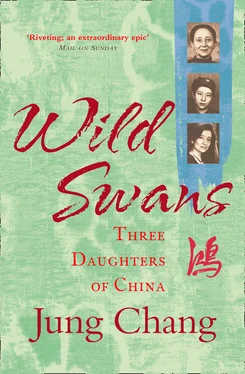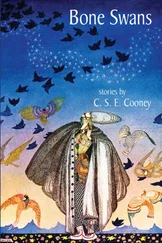1 ...7 8 9 11 12 13 ...31 The doctor was already an elderly man when he proposed to my grandmother. He was sixty-five, and a widower, with three grown-up sons and one daughter, all of them married. The three sons lived in the house with him. The eldest looked after the household and managed the family farm, the second worked in his father’s practice, and the third, who was married to my grandmother’s school friend, was a teacher. Between them the sons had eight children, one of whom was married and had a son himself.
Dr Xia called his sons into his study and told them about his plans. They stole disbelieving, leaden glances at one another. There was a heavy silence. Then the eldest spoke: ‘I presume, Father, you mean she will be a concubine.’ Dr Xia replied that he was going to take my grandmother as a proper wife. This had tremendous implications, as she would become their stepmother, and would have to be treated as a member of the older generation, with venerable status on a par with her husband. In an ordinary Chinese household the younger generations had to be subservient to the older, with suitable decorum to mark their relative positions, but Dr Xia adhered to an even more complicated Manchu system of etiquette. The younger generations had to pay their respects to the older every morning and evening, the men kneeling and the women curtsying. At festivals, the men had to do a full kowtow. The fact that my grandmother had been a concubine, plus the age gap, which meant they would have to do obeisance to someone with an inferior status and much younger than themselves, was too much for the sons.
They got together with the rest of the family and worked themselves up into a state of outrage. Even the daughter-in-law who was my grandmother’s old school friend was upset, as her father-in-law’s marriage would force her into a radically new relationship with someone who had been her classmate. She would not be able to eat at the same table as her old friend, or even sit down with her, she would have to wait on her hand and foot, and even kowtow to her.
Each member of the family—sons, daughters-in-law, grandchildren, even the great-grandson—went in turn to beg Dr Xia to ‘consider the feelings’ of his ‘own flesh and blood’. They went down on their knees, they prostrated themselves in a full kowtow, they wept and screamed.
They begged Dr Xia to consider the fact that he was a Manchu, and that according to ancient Manchu custom a man of his status should not marry a Han Chinese. Dr Xia replied that the rule had been abolished a long time before. His children said that if he was a good Manchu, he should observe it anyway. They went on and on about the age gap. Dr Xia was more than twice my grandmother’s age. One of the family trotted out an ancient saying: ‘A young wife who has an old husband is really another man’s woman.’
What hurt Dr Xia more was the emotional blackmail—especially the argument that taking an ex-concubine as a proper wife would affect his children’s position in society. He knew his children would lose face, and he felt guilty about this. But Dr Xia felt he had to put my grandmother’s happiness first. If he took her as a concubine, she would not merely lose face, she would become the slave of the whole family. His love alone would not be enough to protect her if she was not his proper wife.
Dr Xia implored his family to grant an old man’s wish. But they—and society—took the attitude that an irresponsible wish should not be indulged. Some hinted that he was senile. Others told him: ‘You already have sons, grandsons, and even a great-grandson, a big and prosperous family. What more do you want? Why do you have to marry her?’
The arguments went on and on. More and more relatives and friends appeared on the scene, all invited by the sons. They unanimously pronounced the marriage to be an insane idea. Then they turned their venom against my grandmother. ‘Marrying again when her late husband’s body and bones are not yet cold!’ ‘That woman has it all worked out: she is refusing to accept concubine status so that she can become a proper wife. If she really loves you, why can’t she be satisfied with being your concubine?’ They attributed motives to my grandmother: she was scheming to get Dr Xia to marry her, and would then take over the family and ill-treat his children and grandchildren.
They also insinuated that she was plotting to lay her hands on Dr Xia’s money. Underneath all their talk about propriety, morality, and Dr Xia’s own good, there was an unspoken calculation involving his assets. The relatives feared my grandmother might lay her hands on Dr Xia’s wealth, as she would automatically become the manageress of the household as his wife.
Dr Xia was a rich man. He owned 2,000 acres of farmland dotted around the county of Yixian, and even had some land south of the Great Wall. His large house in the town was built of grey bricks stylishly outlined in white paint. Its ceilings were whitewashed and the rooms were wallpapered, so that the beams and joints were concealed, which was considered an important indicator of prosperity. He also owned a flourishing medical practice and a medicine shop.
When the family saw they were getting nowhere, they decided to work on my grandmother directly. One day the daughter-in-law who had been at school with her paid a call. After tea and social chitchat, the friend got around to her mission. My grandmother burst into tears, and took her by the hand in their usual intimate manner. What would she do if she were in her position, she asked. When she got no reply, she pressed on: ‘You know what being a concubine is like. You wouldn’t like to be one, would you? You know, there is an expression of Confucius: “Jiang-xin-bi-xin —Imagine my heart was yours”!’ Appealing to someone’s better instincts with a precept from the sage sometimes worked better than a direct no.
The friend went back to her family feeling quite guilty, and reported her failure. She hinted that she did not have the heart to push my grandmother any more. She found an ally in De-gui, Dr Xia’s second son, who practised medicine with his father, and was closer to him than his brothers. He said he thought they should let the marriage go ahead. The third son also began to weaken when he heard his wife describe my grandmother’s distress.
The ones who were most indignant were the eldest son and his wife. When she saw that the other two sons were wavering, the eldest son’s wife said to her husband: ‘Of course they don’t care. They’ve got other jobs. That woman can’t take those away from them. But what have you got? You are only the manager of the old man’s estate—and it will all go to her and her daughter! What will become of poor me and our poor children? We have nothing to fall back on. Perhaps we should all die! Perhaps that is what your father really wants! Perhaps I should kill myself to make them all happy!’ All this was accompanied by wailing and floods of tears. Her husband replied in an agitated manner: ‘Just give me till tomorrow.’
When Dr Xia woke the next morning he found his entire family, with the sole exception of De-gui, fifteen people in all, kneeling outside his bedchamber. The moment he emerged, his eldest son shouted ‘Kowtow!’ and they all prostrated themselves in unison. Then, in a voice quaking with emotion, the son declaimed: ‘Father, your children and your entire family will stay here and kowtow to you till our deaths unless you start to think of us, your family—and, above all, your elderly self.’
Dr Xia was so angry his whole body shook. He asked his children to stand up, but before anyone could move the eldest son spoke again: ‘No, Father, we won’t—not unless you call off the wedding!’ Dr Xia tried to reason with him, but the son continued to hector him in a quivering voice. Finally Dr Xia said: ‘I know what is on your minds. I won’t be in this world much longer. If you are worried about how your future stepmother will behave, I have not the slightest doubt that she will treat you all very well. I know she is a good person. Surely you can see there is no other reassurance I can give you except her character…’
Читать дальше












